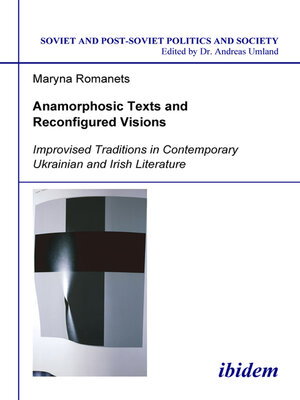Anamorphosic Texts and Reconfigured Visions
ebook ∣ Improvised Traditions in Contemporary Ukrainian and Irish Literature · Soviet and Post-Soviet Politics and Society
By Maryna Romanets

Sign up to save your library
With an OverDrive account, you can save your favorite libraries for at-a-glance information about availability. Find out more about OverDrive accounts.
Find this title in Libby, the library reading app by OverDrive.



Search for a digital library with this title
Title found at these libraries:
| Library Name | Distance |
|---|---|
| Loading... |
In Anamorphosic Texts, Maryna Romanets turns a discriminating lens on a still "liminal" Ukrainian cultural space and, through its relation to the experiences of one of the earliest decolonized nations, Ireland, puts it on the discursive postcolonial map, thereby destabilizing the paradigm of homogeneous Eurocentricity adopted by much postcolonial critique. Bringing together two peripheral European literatures, Romanets uses Irish and Ukrainian histories as a shared point of reference, charting an essentially untouched area of comparative typology in postcolonial cultural politics. Returning to the chiaroscuro terrain of respective nineteenth-century Revivalist movements, she projects their volatile energies onto contemporary struggles of the two cultures to represent their occluded, traumatic pasts and ever-evasive presents. In five linked essays, Romanets explores, in their sociocultural contexts, the works of Kostenko, Ní Dhomhnaill, Zabuzhko, Pokalchuk, Vynnychuk, Poderviansky, Longley, Heaney, Murphy, Carson, Montague, Banville, and Izdryk. She examines the ways these authors evoke the significatory powers of their traditions to forge imaginary ones; interrogate the boundaries and slippages among personal, national, social, gendered, and historical disjunctions; and make every history open to revision and contestation. Drawing on postcolonial, intertextual, representation, and gender theories, Anamorphosic Texts reveals the mechanisms of conversion whereby Ukrainian and Irish writers, by engaging in epistemic dialogues with their own traditions, colonial discourses, and multicultural influxes, devise political strategies of empowerment and enunciation.







